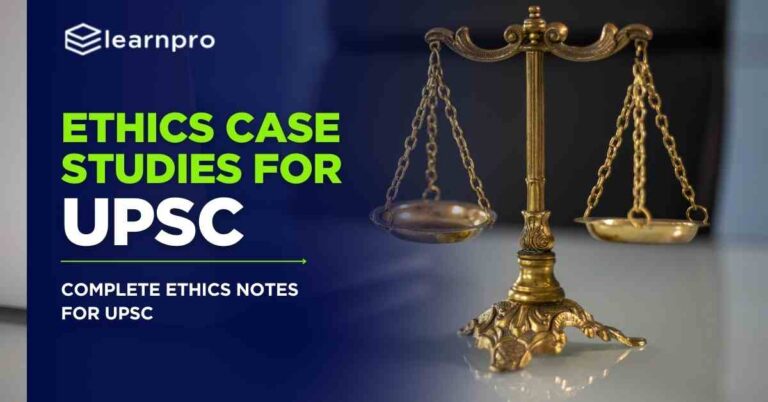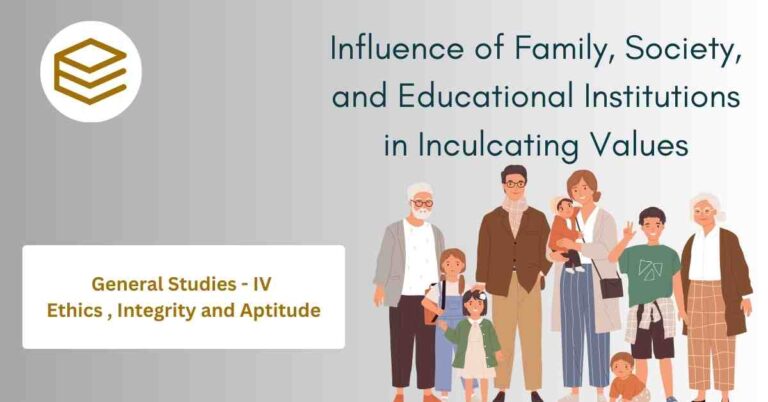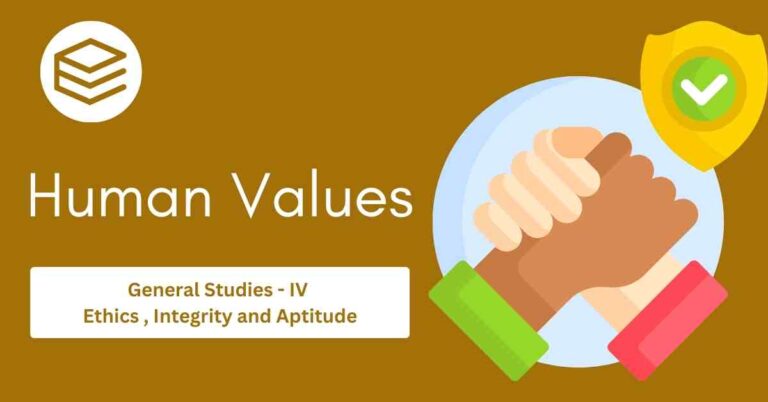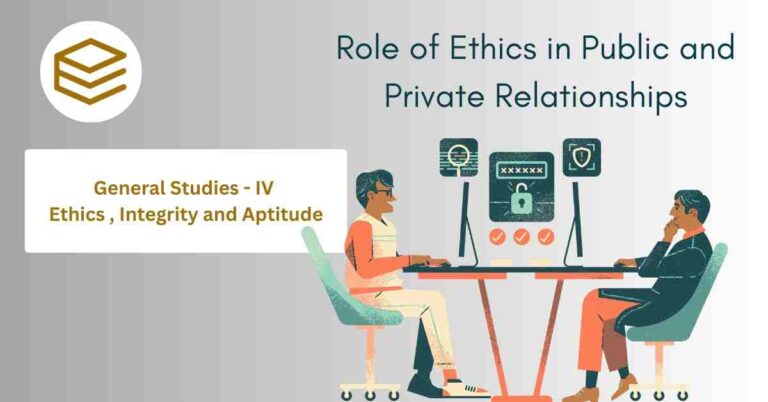January 25, 2026 2:26 am
Ethics in public administration is a cornerstone of good governance. It ensures that public officials act in a manner that upholds integrity, transparency, and accountability. For UPSC GS Paper IV, understanding ethics in the context of public administration is critical as it forms the basis for addressing ethical dilemmas and case studies.
- Promotes Accountability: Ethical practices ensure public officials are answerable for their decisions and actions.
- Builds Public Trust: Transparency and fairness enhance citizens’ confidence in governmental institutions.
- Ensures Equity: Upholds the principles of justice and impartiality in decision-making.
- Fosters Integrity: Encourages adherence to moral values and ethical principles, reducing corruption.
1. Values in Public Administration
Ethics in public administration revolves around certain core values:
- Integrity: Adherence to moral principles and honesty.
- Objectivity: Making decisions based on merit, without bias.
- Impartiality: Treating everyone equally under the law.
- Compassion: Empathizing with the challenges faced by citizens, especially the vulnerable.
2. Ethical Theories Relevant to Public Administration
- Deontological Ethics: Focuses on duties and rules, regardless of the outcomes.
- Utilitarianism: Advocates the greatest good for the greatest number.
- Virtue Ethics: Emphasizes the role of character and virtues in ethical decision-making.
3. Tools to Promote Ethics
- Code of Conduct: Defines acceptable behavior for public officials.
- Citizen Charters: Specifies the services citizens can expect from public offices.
- Ethics Committees: Monitors and enforces ethical behavior.
- Whistleblower Protection: Safeguards individuals who report unethical practices.
1. Corruption
- Misuse of public office for private gain undermines trust and governance.
- Example: Cases of bribery in infrastructure projects.
2. Conflict of Interest
- When personal interests interfere with official duties.
- Example: A policymaker benefiting from a company related to the policies they frame.
3. Lack of Transparency
- Decisions made without proper disclosure or accountability.
- Example: Opaque tendering processes.
4. Nepotism and Favoritism
- Appointment or promotion based on connections rather than merit.
- Example: Preferential treatment in recruitment processes.
5. Misuse of Authority
- Abuse of power to oppress or exploit citizens.
- Example: Illegal detention by law enforcement officers.
Case Study 1: Role of IAS Officer Armstrong Pame
Known as the “Miracle Man,” Armstrong Pame built a 100-km road in a remote village in Manipur without government funding, using crowdfunding. His initiative reflects selflessness, integrity, and dedication.
Case Study 2: Exemplary Governance in Kerala
During the floods of 2018, the state administration demonstrated accountability, transparency, and efficiency in managing the crisis, setting a benchmark for ethical governance.
Steps to Resolve Ethical Dilemmas
- Identify the Conflict: Analyze the situation to understand the ethical challenge.
- Evaluate Stakeholders: Consider how decisions affect various parties involved.
- Examine Legal and Moral Principles: Check alignment with laws, rules, and ethical values.
- Make an Informed Decision: Choose an option that upholds integrity, justice, and the public good.
- Document the Process: Maintain records of decisions to ensure transparency.
Strategies to Improve Ethics in Public Administration
- Training Programs: Conduct regular workshops on ethical decision-making.
- Performance-Based Evaluations: Assess public officials based on their adherence to ethical practices.
- Transparency in Operations: Publish details of public projects and expenditures.
- Involvement of Civil Society: Encourage NGOs and citizen groups to participate in governance.
- Robust Legal Frameworks: Strengthen laws to penalize unethical behavior effectively.
UPSC-Specific Relevance of Ethics in Public Administration
In GS Paper IV
- Questions often test understanding of ethical dilemmas, values, and principles in governance.
- Case Studies: Ethics-related questions often involve real-world dilemmas public officials face.
In Essay Paper
- Topics related to governance and ethics often appear, such as “Integrity without knowledge is weak and useless, and knowledge without integrity is dangerous and dreadful.”
In Interviews
- Candidates are frequently asked about ethical scenarios to assess their integrity and decision-making skills.
You are a district magistrate in a rural district where illegal sand mining is rampant along a major river. This activity has led to environmental degradation, causing soil erosion and a decline in groundwater levels. While the mining provides livelihoods to many local laborers, it also creates safety hazards, damages farmlands, and disrupts the natural ecosystem. A group of environmental activists has raised the issue with the state government, while local workers oppose a blanket ban on mining, fearing job losses.
Questions:
- How would you balance environmental conservation with the livelihoods of local workers?
- What immediate measures would you implement to address the issue?
- How would you handle conflicting demands from environmental activists and the local labor force?
- What long-term policy recommendations would you suggest to resolve the conflict sustainably?
Approach:
1. Analyze the Situation Thoroughly
- Data Collection: Conduct a comprehensive survey of the mining areas to assess the extent of environmental degradation and its impact on the local ecosystem and groundwater levels.
- Stakeholder Consultation: Engage with environmental experts, local laborers, landowners, and activists to understand their perspectives.
2. Immediate Measures
- Enforcement of Regulations:
- Halt illegal sand mining activities immediately by deploying local police and revenue officials.
- Identify the operators involved in illegal activities and take legal action as per the Environmental Protection Act, 1986, and the Mines and Minerals (Development and Regulation) Act, 1957.
- Awareness Campaigns:
- Educate the local population about the long-term dangers of unchecked mining, such as flooding, reduced agricultural productivity, and ecological damage.
- Highlight sustainable livelihood alternatives available in the region.
- Temporary Employment Measures:
- Collaborate with the District Rural Development Agency (DRDA) to provide temporary jobs through schemes like MGNREGA for affected workers.
3. Balancing Conflicting Demands
- For Environmental Activists:
- Reassure them of strict enforcement measures to curb illegal mining.
- Involve them in designing sustainable sand mining policies that minimize environmental damage.
- For Local Workers:
- Emphasize the need for sustainable mining practices that ensure job security and environmental protection.
- Explore skill development programs to train workers in alternative trades such as construction, eco-tourism, or agro-based industries.
4. Long-Term Policy Recommendations
- Promote Sustainable Mining Practices:
- Introduce licensed sand mining with strict regulations to ensure minimal environmental damage.
- Use technologies like drones and satellite imagery to monitor mining activities.
- Afforestation and Ecological Restoration:
- Launch initiatives to restore degraded land and riverbanks, funded through penalties levied on illegal mining operators.
- Livelihood Diversification:
- Establish small-scale industries such as brick kilns or handicrafts to create alternative employment opportunities.
- Promote community-based eco-tourism to leverage the natural beauty of the area.
- Community Participation:
- Form village-level committees to monitor mining activities and report violations.
5. Communication and Mediation
- Organize public hearings to discuss the issue openly with all stakeholders.
- Ensure transparency in decision-making to build trust among activists, workers, and local communities.
Conclusion
The approach focuses on immediate enforcement, long-term ecological restoration, and livelihood diversification. By balancing environmental conservation with the economic needs of local workers, the district administration can resolve the conflict sustainably while ensuring compliance with legal and ethical principles.
Useful Links >>
UPSC Mains Syllabus – General Studies-I: This post provides a detailed breakdown of the General Studies-I syllabus, covering Indian Heritage and Culture, History, and Geography of the World and Society.
Complete Notes of History for UPSC: A comprehensive collection of history notes tailored for UPSC aspirants, encompassing ancient, medieval, and modern Indian history.
UPSC CSE Exam 2025: An Insight: Gain insights into the UPSC Civil Services Examination for 2025, including important dates, exam patterns, and preparation strategies.
Important Books for UPSC Exams: A curated list of essential books recommended for various subjects in the UPSC examination, aiding in effective study planning.
UPSC Prelims Syllabus: An in-depth overview of the UPSC Preliminary Examination syllabus, helping candidates understand the topics to focus on during their preparation.






[…] The Role of Ethics in Public Administration: Insights for GS Paper IV […]